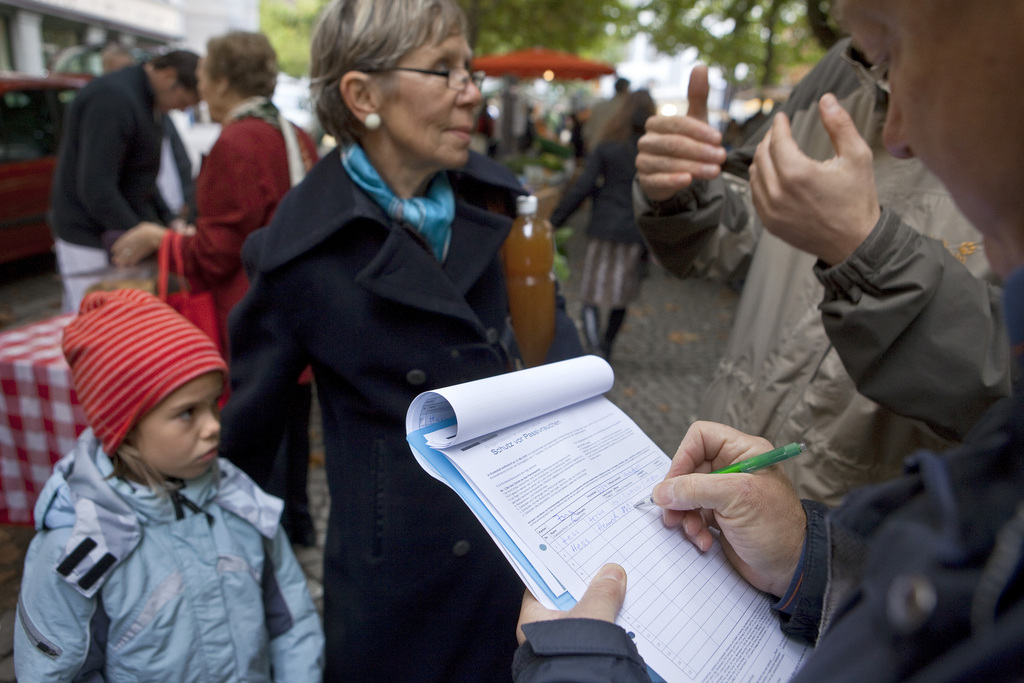When initiatives play on fears and stereotypes

Several popular initiatives in recent years have more or less openly played upon a perceived foreign threat, leading some Swiss to again question whether the right to launch popular votes should be limited.
It’s a debate the Swiss have been having since the introduction of popular initiatives in 1893. This extract from the Journal de Genève (Geneva Journal) following the acceptance by 60% of voters of an initiative put forward by German-speaking animal welfare groups on August 20 of the same year, demonstrates the passions surrounding the issue at the time.
“The good souls who believed the new constitutional article was strengthening humanitarian trends, and who in fact by voting for it played the game of anti-Semitism, should recognise that they were mistaken. (…) And not through lack of being warned.”
The initiative, which had been rejected by both the cabinet and parliament, enshrined in the Swiss constitution the banning of “bleeding of slaughter animals that have not been properly stunned first”, or “the method of slaughtering animals as used by Jews” according to opponents of Switzerland’s first ever popular initiative.
The archives of the Journal de Genève reveal this warning from a committee of opponents to the “zoophiles”, as they called the animal rights campaigners at the time: “It should not be that the right of initiative, used today for the first time, becomes an instrument of oppression in the hands of one race against another, of one group of the people against another.”
Johanne Gurfinkiel, general secretary of the Intercommunity Coordination against Anti-Semitism and defamation (CICAD), says that the initiative was, for some of its instigators and voters, about “punishing Swiss Jews who had recently become full citizens, notably under pressure from France and the United States”.
A decade ago, the cabinet attempted to repeal the law because of its discriminatory effects, however it failed to follow through in order to avoid what promised to be a passionate and divisive campaign.
Xenophobic initiatives
Starting with the “Schwarzenbach” initiative (named after the head of the rightwing party which proposed it), which aimed to limit the number of foreigners, the 1970s saw a series of initiatives targeting migrant workers, which fed some particularly virulent debates.
The 1970 ballot obtained 46% of the vote in favour, and had an unusually high voter turnout at 74%.
During the 2000s, foreigners were again the object of several popular initiatives, most often initiated and supported by the rightwing Swiss People’s Party and opposed by the other political groups. Again, the publicity campaigns preceding the votes stigmatised foreigners. Most notable amongst them was the initiative against the construction of new minarets that was passed with 57.5% of the vote in November 2009.
And the vote on February 9 this year that imposed quotas on foreigners living in Switzerland, while it didn’t target a particular community, is also an example of mistrust of Europe, as incarnated by the European Union, and foreigners who come to live in Switzerland.
Such was the controversy created by the vote, German president Joachim Gauck was in early April moved to somewhat controversially comment publicly. Gauck said that he did not want to, and could not imagine a country as diverse as Switzerland and which had never known a dictatorship, distance itself from Europe.
While declaring he respected the Swiss vote, Guack noted that direct democracy could sometimes represent “a great danger” in relation to complex issues about which it is sometimes difficult for citizens to understand all the implications. For this reason, the president said, Germany was happy with its version of representative democracy.
By way of retort, Swiss president Didier Burkhalter said: “Direct democracy in Switzerland is like blood running through the veins.”

More
Raising the bar for people’s initiatives
Limits on initiatives?
However, several observers and Swiss politicians remain worried about the growing number of initiatives that play on fears and stereotypes.
Should there be limits on direct democracy to guard against the political passions and xenophobes that the system can give expression to?
Warnings about “the dangers of an institution that serves as an instrument in the hands of demagogues or that give an excessive influence to small, well organised groups” have been made since the introduction of direct democracy, according to the Historical Dictionary of Switzerland.
The President of the Federal Commission Against Racism, Martine Brunschwig-Graf, says the Swiss parliament acts as a filter against extremism.
“A text that is racist or discriminatory will be voided by the parliament. Debates have taken place to find out if an initiative is contrary to international law and to international commitments made by Switzerland,” she says.
“An initiative can reveal a visceral climate that is not necessarily about the subject itself but about what the subject awakens in some people. That exists today as it did before. Democracy allows for debates to take place that cannot be channelled by laws.”
The ratification by Switzerland of the European Human Rights Convention (in effect since 1974) and the adoption by the people in 1994 of anti-racist legislation were turning points, at least for human rights defenders.
A contested article
“Until 1974, fundamental rights were not guaranteed in the federal or cantonal constitutions,” remarks constitutional expert Andreas Auer.
In ratifying the European Human Rights Convention, European states effectively gave up their sovereignty in this area to defer to the European Court of Human Rights in Strasbourg.
“That a citizen can sue his own government in an international court is an extraordinary acquisition in the protection of human rights,” says Auer.
People’s Party parliamentarian and Geneva lawyer Yves Nidegger, whose party has for several years pushed issues about foreigners, says the anti-racist protection in the constitution is superfluous.
“I do not believe that article 261bis [anti-racist legislation] serves any purpose at all. It is neither necessary, nor useful,” says Nidegger.
Nidegger cites the recent ruling by the Strasbourg court that invalidated the Swiss conviction of Turkish nationalist Dogu Perinçek for having denied the Armenian genocide. The Strasbourg ruling put the rights of free expression first, whereas the Swiss Federal Court based its ruling on article 261bis. Switzerland has decided to appeal the Strasbourg decision.
Arbitration
In other political circles, some people believe that in the wake of the February 9 vote, which generally surprised the political class, it would be useful to reinforce the conditions under which popular initiatives can be held.
Auer remains sceptical: “Suppose that they insist on having a double majority [of people and cantons]. That raises the question of knowing who will control compliance. The parliament, as a political organisation, is not able to do it, and to give this power to the Federal Court, you would have to revise the constitution.”
Brunschwig-Graf points to other effects of increased control over popular initiatives.
“We cannot preventatively stop an initiative under the pretext that it could give rise to debates that we would rather not have. We can’t legislate people’s intentions. We would fall into a system conducive to arbitrary censorship.
“In a democratic system, each player [initiator, political party, parliamentarians and the media] and all those who participate in a campaign have the responsibility to have the debate in a correct context,” she says.
In other words, it’s not about breaking the thermometer of direct democracy, even when the temperature reaches fever pitch amongst the Swiss population.
Fourteen months after it was adopted, the article which revised the Constitution to allow for popular initiatives was used for the first time with a text that proposed outlawing the ritual slaughter of animals.
Put to the people without delay, the initiative was accepted in August 1893 upon a reasoning which mixed animal rights with anti-Semitism.
Despite this initial success, recourse to the popular initiative remained a rare occurrence for the next 40 years. Its use became more frequent during the global economic crisis of the 1920s and again during the 1950s (financial, social and military questions) after being eclipsed during the Second World War and the years immediately after.
After another break, popular initiatives once again gained ground during the 1970s in the context of a general questioning of, on both the left and right, compromise democracy.
Source: Swiss Historical Dictionary
(Translated from French by Sophie Douez)

In compliance with the JTI standards
More: SWI swissinfo.ch certified by the Journalism Trust Initiative









You can find an overview of ongoing debates with our journalists here . Please join us!
If you want to start a conversation about a topic raised in this article or want to report factual errors, email us at english@swissinfo.ch.